Nature in poetry. Posted by hulda on Sep 26, 2013 in Icelandic culture, Icelandic history
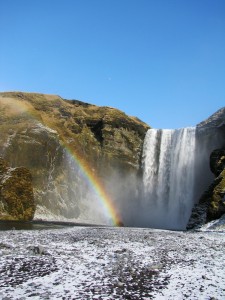 I’ve come to believe that Icelandic people’s relationship with Icelandic nature is of the strongest kind there is. Logically thinking this is not surprising: just look around to see what I mean. On particularly beautiful mornings I still find it hard to believe that Esjan, the mountain looking over Reykjavík in the north, is real and not just a giant decorative backdrop, regardless of the fact that I’ve climbed it a couple of times and therefore should know for fact that it’s definitely there and over 600 m tall. Many wonderful sights of nature are but a short drive away from the capital city, some of them being literally in the neighbourhood such as the Elliðarárdalur, Elliða river valley that’s located near Breiðholt where I live.
I’ve come to believe that Icelandic people’s relationship with Icelandic nature is of the strongest kind there is. Logically thinking this is not surprising: just look around to see what I mean. On particularly beautiful mornings I still find it hard to believe that Esjan, the mountain looking over Reykjavík in the north, is real and not just a giant decorative backdrop, regardless of the fact that I’ve climbed it a couple of times and therefore should know for fact that it’s definitely there and over 600 m tall. Many wonderful sights of nature are but a short drive away from the capital city, some of them being literally in the neighbourhood such as the Elliðarárdalur, Elliða river valley that’s located near Breiðholt where I live.
Another reason that keeps the nature in everyone’s mind here is that you literally cannot ignore it from time to time. The unpredictable weather can turn dangerous in a matter of minutes at worst, and even when it’s less extreme it still surprises you with f.ex. horizontal rain. I’m not kidding about that last part as anyone who’s experienced it can tell.
It’s therefore no surprise that nature has found its way especially into art of all forms and especially poetry. Jónas Hallgrímsson, one of the most loved poets in Iceland, was in particular interested in it. This can be criticized by mentioning his part of the romantic movement, but even outside of the patriotic brouhaha Jónas’ fascination with his surroundings comes across clearly, especially by his more playful works. I’ve translated three short poems here word by word, but for better translations you can go to a web page dedicated to his poetry (link).
Dalabóndinn í óþurrknum
Hví svo þrúðgu þú
þokuhlassi
súldanorn
um sveitir ekur?
Þér man eg offra
til árbóta
kú og konu
og kristindómi.
A Valley Farmer in Wet Weather
Why so strongly you,
a cartload of mist,
drizzle-goddess,
drive over the lands?
I will offer you
for a bit of sunlight
a cow, my wife
and my Christianity.
This poem that’s written in the traditional Icelandic metre (of the older type) bears a very Jónas-like serious beginning that only turns humorous at the last two lines and bears a clever comparison to a real agricultural practice, the spreading of pulverized dung as a fertilizer on the fields.
The ending of this poem is laden with much more than meet’s the eye. Iceland is quite rainy a country a wet end of the summer was a disaster to an Icelandic farmer. Hay needs to dry before it’s stored for the winter and if it doesn’t, well, then there’s nothing for the animals to eat which states probable loss of cattle. This in turn means either having to spend money buying new animals or, at worst, a complete financial collapse and hunger. There is therefore a hint of tragedy behind the words of this bóndi (= farmer) who would sell his very faith for one ray of sunshine, not to mention that there could also be a wife and one cow thrown in the deal.
Skuggabaldur úti einn
Skuggabaldur úti einn
öli daufu rennir,
skrugguvaldur hvurgi seinn
himinraufar glennir.
Shadow-Baldur outside alone
Shadow-Baldur outside alone
lets out watery beer,
thunder-wielder, never late for his mark,
opens the heaven’s sluices.
This poem is a lot more complicated than it at first look like and needs some background information to be fully understood. Skuggabaldur is a name of an Icelandic monstrous cat-fox, a beast that can kill you by looking at you (and unlike with other creatures such as the basilisk that bear similar talents, a skuggabaldur does not have to meet your eyes – if it sees you you die)(link to more info on this beast). However, this skugga-Baldur was not quite as horrible as that, if you know that Jónas’ horse’s name was Baldur.
When he wrote this poem Jónas was sitting in his tent in a pouring rain. He had been staying at a farm but the wife of the farmer was having difficulty giving birth to a child, and Jónas was confined outside of the house until the childbirth would be over. Skugga-Baldur translates also as shadow-Baldur, and in this instance probably meant the faint shadow of his horse that he could see through the fabric of the tent. As for the watery beer, this stands for the horse pissing next to his tent and makes a sound comparison to thunder-wielder (Þór, or Thor) opening “the heaven’s sluices”, causing a sudden outpour of rain.
Við Sogið sat ég í vindi
Við Sogið sat eg í vindi,
sækaldri norðanátt,
og þótti þurrleg seta,
þar var af lifandi fátt.
En sólin reis in sæla,
sveipaði skýjum frá;
upp komu allar skepnur
að una lífinu þá.
Og svo var margt af mýi —
mökk fyrir sólu ber —
að Þórður sortnaði sjálfur
og sópar framan úr sér.
I sat by the Sog in wind
I sat by the Sog in wind,
sea-cold, northern,
and thought from my dry seat
that very few living things were around.
But the sun rose, lovely,
sweeping the clouds away;
all kinds of creatures arose
sated with life, then.
And so there were lots of midges
a cloud of them in front of the sun
that Þórður himself seemed to darken
and keeps wiping his face.
Sog is a lake famous for the gnats that live and breed there. If you’ve ever been to a really bad swarm of blackflies you know it’s not a laughing matter: besides stinging they fly into your eyes, nostrils, ears and mouth, into your clothes, anywhere they can. Me and the SO once accidentally wandered into one such cloud in the Mývatnssvæði, Mosquito Lake area and found out in a very practical way that it has its name for a good reason! We ended up running for our lives until we got out of their reach. The midges only fly during the daytime as the poem mentions and all the more the warmer and sunnier the day is. Þórður (who is a real person, Þórður Gíslason who owned a farm near the lake) is actually quite a stoic person for only swatting at them instead of doing what we did – run away.
Midges, by the way, have traditionally been linked to the devil in Icelandic folklore, especially through the name Lord of the Flies, which he has in Icelandic as well (= Flugnahöfðingi).
To end with, here are the three poems read out loud. I had to record them way more often than usually because my belly decided to start growling and just would not stop! I included one such part as a blooper. 😀

Build vocabulary, practice pronunciation, and more with Transparent Language Online. Available anytime, anywhere, on any device.
About the Author: hulda
Hi, I'm Hulda, originally Finnish but now living in the suburbs of Reykjavík. I'm here to help you in any way I can if you're considering learning Icelandic. Nice to meet you!



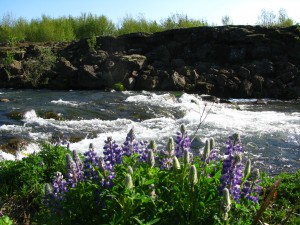
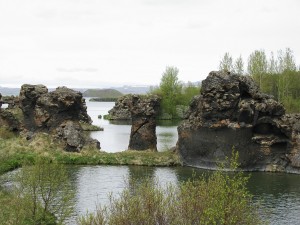
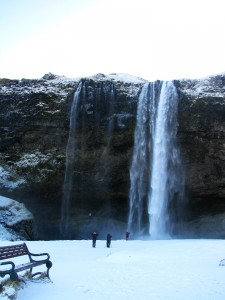
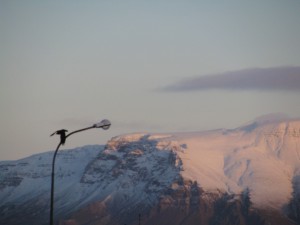
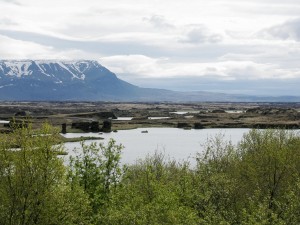

Comments:
Wes:
Hi, hulda,
I’m really enjoying your Icelandic blog here. It’s been quite helpful for both the language and culture of Iceland [plus nature, of course). Keep up the good work. 🙂
hulda:
@Wes Happy to hear that, and welcome! 🙂
Sigrid:
Hi Hulda,
I´ve stumbled over your blog by chance. I was looking for Icelandic poems on youtube because I have the idea to use peoms for a short holiday-film, or something like this on my travels to and through Iceland and mix them with music.
Sigrid
Thomas and Debra:
Hi Hulda! We are so pleased to find your posts. Thank you for print and spoken versions. Could we have your permission to properly attribute and read them at our 12th annual university international poetry reading?
Best wishes! Thomas and Debra
PS- We raise registered Icelandic sheep for wool. They are our ancient muses and mentors…and we so well know the midges and fogs of the poems you posted!